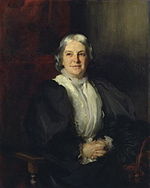Octavia Hill, Date of Birth, Place of Birth, Date of Death
TweetOctavia Hill
English social reformer
 Date of Birth: 03-Dec-1838
Date of Birth: 03-Dec-1838
 Place of Birth: Wisbech, England, United Kingdom
Place of Birth: Wisbech, England, United Kingdom
Date of Death: 13-Aug-1912
Profession: writer, social reformer
Zodiac Sign: Sagittarius 
About Octavia Hill
- Octavia Hill (3 December 1838 – 13 August 1912) was an English social reformer, whose main concern was the welfare of the inhabitants of cities, especially London, in the second half of the nineteenth century.
- Born into a family with a strong commitment to alleviating poverty, she herself grew up in straitened circumstances owing to the financial failure of her father's businesses.
- With no formal schooling, she worked from the age of 14 for the welfare of working people. Hill was a moving force behind the development of social housing, and her early friendship with John Ruskin enabled her to put her theories into practice with the aid of his initial investment.
- She believed in self-reliance, and made it a key part of her housing system that she and her assistants knew their tenants personally and encouraged them to better themselves.
- She was opposed to municipal provision of housing, believing it to be bureaucratic and impersonal. Another of Hill's concerns was the availability of open spaces for poor people.
- She campaigned against development on existing suburban woodlands, and helped to save London's Hampstead Heath and Parliament Hill Fields from being built on.
- She was one of the three founders of the National Trust, set up to preserve places of historic interest or natural beauty for the enjoyment of the British public.
- She was a founder member of the Charity Organisation Society (now the charity Family Action) which organised charitable grants and pioneered a home-visiting service that formed the basis for modern social work.
- She was a member of the Royal Commission on the Poor Laws in 1905. Hill's legacy includes the large holdings of the modern National Trust, several housing projects still run on her lines, a tradition of training for housing managers, and the Octavia Hill Birthplace House established by the Octavia Hill Society at her birthplace in Wisbech.
Read more at Wikipedia
See Also
- Famous People's Birthdays on 03 December, United Kingdom
- Famous People's Birthdays in December, United Kingdom
- Famous writer's Birthdays on 03 December, United Kingdom
- Famous writer's Birthdays in December, United Kingdom
- Famous social reformer's Birthdays on 03 December, United Kingdom
- Famous social reformer's Birthdays in December, United Kingdom



